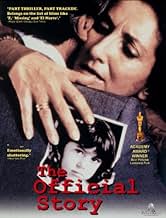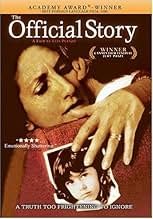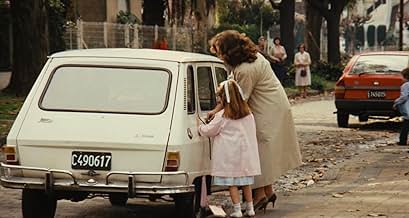CALIFICACIÓN DE IMDb
7.7/10
11 k
TU CALIFICACIÓN
Durante los últimos meses de la dictadura militar argentina de 1983, un profesor de instituto decide a averiguar quién es la verdadera madre de su hija adoptada.Durante los últimos meses de la dictadura militar argentina de 1983, un profesor de instituto decide a averiguar quién es la verdadera madre de su hija adoptada.Durante los últimos meses de la dictadura militar argentina de 1983, un profesor de instituto decide a averiguar quién es la verdadera madre de su hija adoptada.
- Dirección
- Guionistas
- Elenco
- Ganó 1 premio Óscar
- 25 premios ganados y 9 nominaciones en total
- Dirección
- Guionistas
- Todo el elenco y el equipo
- Producción, taquilla y más en IMDbPro
Opiniones destacadas
I saw this movie in my first-year Spanish class. I love all kinds of movies, both international and domestic. This is by far one of the best movies I have seen in the international field with particular focus on the character development of one woman who seems to have everything. In coming to terms with the truth of her lifestyle and the high price others have paid for her comfort, she becomes a heroine who must give up almost everything she has loved and felt identified who she is. This movie is both heartbreaking and reassuring for its audience. I highly recommend it as a thoughtful depiction of how ignoring politics can imply inadvertently becoming an accomplice.
La Historia Official is a well-made film about awakening from passive complicity in evil, in this case, forced adoption. The Grandmothers of the Plaza de Mayo were and are an inspiration to those who struggle to uncover and resist abuses in adoption practices, be they the enslaved Irish women of the Magdalen laundries or the many indigenous peoples who had children forcibly removed from homes to be adopted by whites. Most of adoption does not involve abduction, but to turn a blind eye to the fact that it does exist, is to be passively complicit, as was the protagonist in this film.
The scene in which the teacher realizes that tremendous evil has indeed been perpetrated, and that she may very well be the beneficiary of such evil, is staggering. Norma Aleandro is a talented enough actress that we believe her initial rejection of this revelation, and her gradual evolution from passive cohort to courageous seeker of the truth.
The scene in which the teacher realizes that tremendous evil has indeed been perpetrated, and that she may very well be the beneficiary of such evil, is staggering. Norma Aleandro is a talented enough actress that we believe her initial rejection of this revelation, and her gradual evolution from passive cohort to courageous seeker of the truth.
10jereco
I cry each time I watch this film. (The scene with Norma Aleandro and the baby clothes) Always gets me. An American film-maker would have made a film about one of the "desaparecidos" (disappeared ones) - but Puenzo is too sharp for that - by making a film about one of the quietly complicit, he has indicted all of us who are aware that things aren't quite right in the world, but choose to ignore the fact...and do nothing. Devastating, political and yet personal. My all-time favorite film.
In the powerful 1985 film The Official Story, Director Luis Puenzo tells the story of a teacher's awakening to conscience at the end of Argentina's "Dirty War" of the late 70s and early 80s. As in Pinochet's Chile, the military secret police sought to consolidate their power by routinely torturing and murdering students, political activists, opponents of the regime, and even expectant mothers. Many ended up as desaparecidos, people taken by the government and not returned. The film is about one mother's search for the truth about her adopted daughter and her discovery brings harsh political reality very close to home.
In The Official Story, Alicia (Norma Aleandro) lives a comfortable middle class life. She teaches History to high school students and enjoys a family that includes her well-to-do husband Roberto (Hector Alterio) and 5-year old adopted daughter Gaby (Analia Castro). Not used to asking questions, she believes whatever she has read in history books and is confused when one of her students tells her that "history is written by assassins." She sees the demonstrations of the "Mothers of Plaza de Mayo", a group seeking information about missing family members but remains uninvolved. When her friend Ana (Chunchuna Villafane) visits after living in exile for many years, however, she learns, in an intensely emotional scene, that Ana had been imprisoned and tortured by the police trying to locate her husband, a suspected "subversive".
Ana tells Alicia that many others had "disappeared" and that babies had been taken from their mothers and given to childless friends of the junta. Alicia begins to wonder if her own child was the daughter of a political victim and questions her husband but when he is evasive, she suspects that he may be hiding a dark secret. Although fearful at the prospect of losing Gaby, Alicia is determined to find out about her daughter's past and begins to search hospital records and government archives. Ultimately, she must confront her own responsibility in a climax of shattering force that underscores the tragedy of political ideologues who would rather destroy family solidarity than risk losing power.
In The Official Story, Alicia (Norma Aleandro) lives a comfortable middle class life. She teaches History to high school students and enjoys a family that includes her well-to-do husband Roberto (Hector Alterio) and 5-year old adopted daughter Gaby (Analia Castro). Not used to asking questions, she believes whatever she has read in history books and is confused when one of her students tells her that "history is written by assassins." She sees the demonstrations of the "Mothers of Plaza de Mayo", a group seeking information about missing family members but remains uninvolved. When her friend Ana (Chunchuna Villafane) visits after living in exile for many years, however, she learns, in an intensely emotional scene, that Ana had been imprisoned and tortured by the police trying to locate her husband, a suspected "subversive".
Ana tells Alicia that many others had "disappeared" and that babies had been taken from their mothers and given to childless friends of the junta. Alicia begins to wonder if her own child was the daughter of a political victim and questions her husband but when he is evasive, she suspects that he may be hiding a dark secret. Although fearful at the prospect of losing Gaby, Alicia is determined to find out about her daughter's past and begins to search hospital records and government archives. Ultimately, she must confront her own responsibility in a climax of shattering force that underscores the tragedy of political ideologues who would rather destroy family solidarity than risk losing power.
La Historia Oficial is an excellent movie. It is also the testimony of the suffering of the Argentinian people during the military dictatorship. But those who are not from Argentina, like myself, can very well be touched by this movie. I was observing the cruelty of the government and thought "my God, totalitarism is always the same, and no matter if the violation of human rights occurs in Argentina under the military regime, in Cuba under the Castro dictatorship, in Chile under Pinochet, in Europe during Hitler, people suffer the same and the least we can do is to feel compassion". A good lesson from this movie, generation after generation we shouldn't forget the victims. They deserve justice.
¿Sabías que…?
- TriviaThe filming began in 1983, the same year that the military dictatorship ended in Argentina. The filming was cancelled due to the threats received by the director, actors and particularly to Analia Castro's family. It was announced that filming was cancelled, but production continued in secret until 1985.
- Versiones alternativasThe 2015 restoration is extended by 2 minutes due to the inclusion of restoration credits at the beginning and end of the film. The opening restoration credits play over the opening scenes in Alicia's classroom. During the restoration end credits, the background goes black and the instrumental version of 'El país de nomeacuerdo' is looped.
Selecciones populares
Inicia sesión para calificar y agrega a la lista de videos para obtener recomendaciones personalizadas
- How long is The Official Story?Con tecnología de Alexa
Detalles
Taquilla
- Total en EE. UU. y Canadá
- USD 29,426
- Fin de semana de estreno en EE. UU. y Canadá
- USD 29,426
- 10 nov 1985
- Total a nivel mundial
- USD 69,832
Contribuir a esta página
Sugiere una edición o agrega el contenido que falta

Principales brechas de datos
By what name was La historia oficial (1985) officially released in India in English?
Responda






























